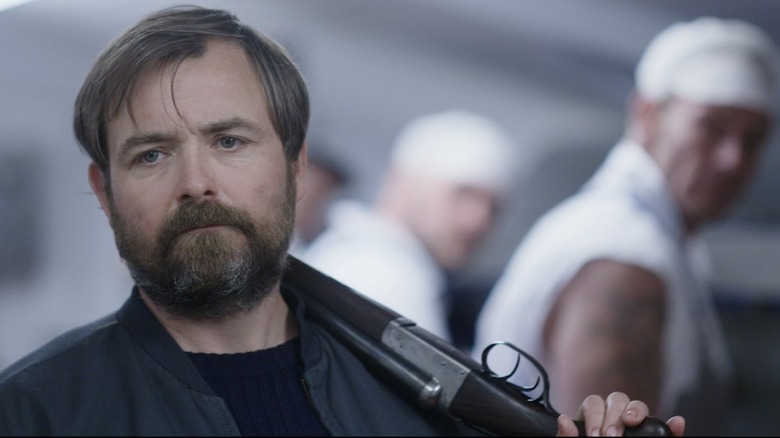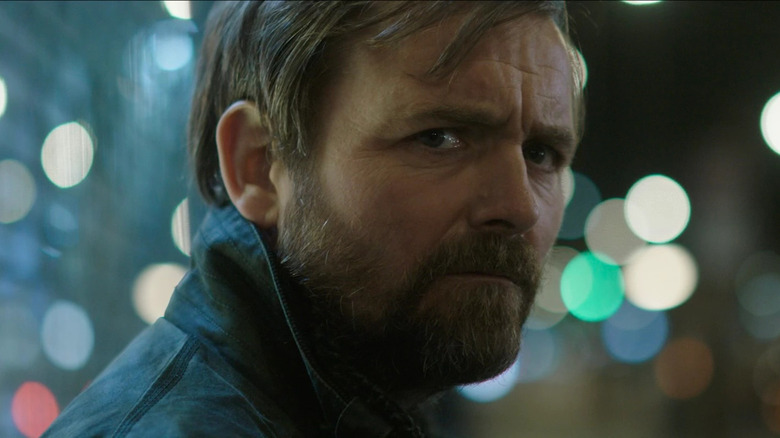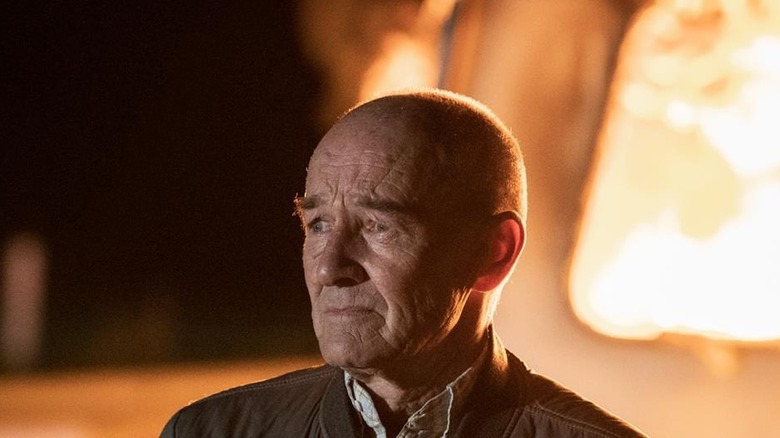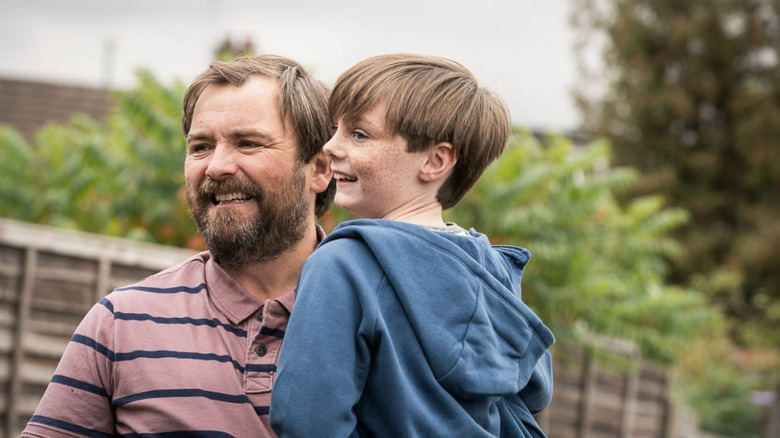Bull Director Paul Andrew Williams Is Not Trying To Please Everyone [Interview]
"Bull" is a revenge movie with some awfully sharp teeth. Writer and director Paul Andrew Williams paints a bleak, unflinching picture of a dangerous man named Bull (Neil Maskell) who is on a warpath. The reasoning for why is explained methodically over the course of the movie with a unique mixture of both speed and patience. At under 90 minutes, there's not a wasted second in Bull's mysterious, blood-soaked journey.
It all pays off in an ending that, love or hate it, is nearly impossible not to have a reaction to. For Williams, he's not trying to be provocative, but if the ending gets a passionate reaction, good or bad, that'll please him. "I'd rather have lots of eight stars and some two stars than loads of 10 stars," he told us during a recent interview about his latest film.
'We're f***ing sh*t bags'
How are you?
Good. We have a young child, so sleeping, busy, but other than that, we're good, man. Very good, indeed.
Well, congratulations on the child and the movie. Was fatherhood on your mind when making it?
No, because I was a father already prior to that. I think I'd always think about that in projects that I write. I think it's a really crazy thing. There's something about that bond cliche, but it is there. It was definitely something that was an inspiration to me in terms of what one would do — that bond between father and son and what one would do.
It's quite a stark contrast seeing Bull at work versus his home life as a father.
I think that we're all very complex, aren't we? We all have varied things where we're very loving and we have a lot of love and stuff to give. And then we're f***ing sh*t bags. Obviously, this is taken to an extreme, but look at Pablo Escobar: Obviously they're not the same kind of people, but he had kids that he actually adored and he used to say that he used to ring up his kids when he was on the run and read them stories over the phone.
I think that it's possible to compound and compartmentalize, love and hate and love and rage and all that stuff. Obviously it's to extremities, but he's like us. He's got these feelings of love and he's also got this rage, but the thing is what we see with Bull first of all, it's not emotional rage — emotional rage comes in the last part of the timeline, but originally that's what he's doing. Do you know what I mean?
When it comes to showing the crime world in the movie, how accurate did you want to be?
Well, the thing is I used to work in this bar or pub where everyone who came in worked in garbage, I think. They worked in the garbage industry, and I was just so curious about them. They acted very secretive. I was like, "Well actually only in the movies, the gangs all do f***ing drugs and have suits and nice cars."
Actually, most people live in towns. I grew up where there were local docks. They built ships that's really crap, but they made money from that. And that's why, where they all lived, it was important to me that they all lived in sh*t houses and it wasn't a glamorous life. They're not glamorous people, so why would they have a glamorous life? It's not something that they aspire to. I think that if you went down to most people's houses who were criminals, it just looked like a normal house.
Was Bull saying, "Tell him I'm coming," a reference to "The Limey"?
God, the thing is, do you know what? That line was ADR. We did that as an afterthought. Listen, I love the line and I've worked with Terrence Stamp and I think it is such a phenomenal film. I guess it was without mentally going, "This would do this." Naturally the thing is, if you say, "I'm coming," it sounds pretty scary if you're a badass. What better actor and what better film to be associated with in terms of a piece of dialogue?
'No one should be that important'
How was it on set when you got to see Neil portray all that rage?
Laughing. Having fun. Being relaxed, and it depends what scene, when it's the scenes where he's f***ing losing it, it's acting there. It is acting. I think if someone was method doing a part [like] that, I wouldn't want to do a film with someone like that — it's too much hassle. Neil is an incredibly nice guy. He is incredibly instinctive and a good actor and all the scenes were good. Fun to do. When it starts to get a bit too intense, it's all technical. It's all having to be really quick.
The movie moves very quickly. It's extremely lean. Is that how you always imagined it?
On the page it was probably really lean. What we're basically doing is relying on an actor to read and go, "I just need to do it lean because I know what I'm performing, and therefore I will bring those lines to life," without having to give you the old speech. The idea is the train goes and you're on it and you don't get off until the end and it speeds along. There isn't much fat, which I love. It's like some amazing movies where there is no fat, which one could only agree with being associated with.
How fast did you have to shoot?
We didn't have many scenes. We were so low budget and the script is basically 95% first draft of stuff. It was not developed. I was very sure of how well I wanted it to be. I think developing would've killed it.
Why's that?
It's not that it definitely would've. It just could have. Just because people would be like, "Well, why does he hate this? Why isn't she going off with him and we explore that?" And I'm like, "Why?" You don't need to know why, you just need to know he does. People are trying to find the reason that someone does something and show it in a movie or a TV show. Whereas I'm like, "We don't need to know why, what we need to know is that he's done it or that he's doing it. We don't necessarily need to know how he was brought up or how he did this to know that this is how he is right now." Because as an actor, he is going, "This is my character."
I wanted to circle back a bit. Have you worked with any method actors? How is it?
I haven't worked with many method actors. I worked with people who can stay in the same accent, stuff like that, but I've not worked with someone who is the character to everyone, because he thinks that's what their character is. And I'm like, "No." No one should be that important.
And it sounds like Neil's much more like, "Let's get the work done."
Yeah. Neil likes acting and he's acting, isn't it? And he takes it seriously. But he also understands that we're not saving lives, man. We're very fortunate to be doing what we're doing, and he's just a good actor. You can tell people who you want to work with very early on in the process.
'Just make it up as you go along'
It's hard to get a reaction these days, but the violence and the practical effects in this movie accomplish that. How do you decide when the image or cutting away and hearing the sound is worse?
I just think it's a natural instinctive thinking. I don't want to spin people out. I'm not someone who wants to watch a film and just continue to see gratuity. And realistically the minute I see someone get that, if it looks real, I'm like, "I don't want to see more than that." Or if it's a prosthetic, I'm like, "If you look at that prosthetic too long, you're going to know it's a prosthetic."
You think about sound and what sound does, because the thing is none of us have ever seen these things. Or most of us are lucky enough to never have seen it or anything like that. And so, the only time we ever do get to watch these things are in the movies, which are often fantastical and nonsense. For me, I'm like, "Sometimes show them what it would be like," because often that's pretty gross and you'd instantly turn your head away. So, you wouldn't see it well anyway.
[Spoilers ahead]
Did you always have that ending in mind?
I knew how Bull arrived, where he was. I did always have that ending, but in terms of how the ending was and all the stuff leading up to, no, I didn't have all that. I didn't know that he was going to get killed. It was just when I write, I tend to have very little idea of where it's going and just make it up as you go along.
[Spoilers over]
How have you found people reacting to the ending?
I'll be honest with you: Some people that like the end a lot, some people absolutely think it destroys the movie. People either love it or they hate it, but I think some people really need it. Can't make it for everyone.
At least people have a strong reaction to it. There's no middle-of-the-road response.
I'd rather have lots of eight stars and some two stars than loads of ten stars. Some people like the film, not everybody is going to like it, but some people really do. And that's great, man. [The fact that] some people like what you do makes you think you can possibly do another one.
I think if you have people liking your thing, what you've done, you can only be grateful, man. And being like, "Wow. Someone's taking the time out to watch it. And someone's being really positive about it. And that's just brilliant." It's better than nobody watching it. It's better people have actually taken time to watch it and be engaged in it and want to talk to me. And that doesn't happen all the time. It's just nice.
Does it make you feel more confident about the next movie?
People in our industry always have imposter syndrome, I think, where they think all they do is make terrible things. I think next time, obviously I'll do something again and just hope that some people like it and if they do, then I guess then that's a success.
I've heard imposter syndrome can get worse in the editing room when you have to watch the movie over and over again.
Oh, it wasn't so close to the end we're like, maybe it's all right. Maybe it's good. The thing is you watch something nonstop. You've got no emotional reaction to it anymore because you just know it so well. When you keep having the same soup every day, it f***ing gets boring.
"Bull" is currently in theaters and now available On Demand and Digital.



